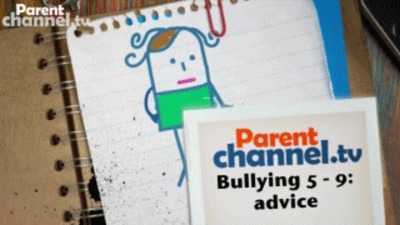 Go to main content
Go to main content
Archive Website of the UK government
Please note that this website has a UK government accesskeys system.
Main menu
Page menu
Video: advice if your 5 to 9 year old is being bullied
Advice on what to do if your child is being bullied.
Can't see the video?

To play this video you need Adobe Flash Player version 9 or higher on your computer and have JavaScript enabled on your browser. Our Help with video files page gives advice if you are unsure how to do this. The Flash software is free.
Text version
Mother: "Until it happened we'd heard about it but hadn't really thought it would happen to one of our children..."
Mother in high street: "Archie had a problem with a friend at school - they were very close - and then it was as if he was being bullied, but I think 'bullied' is quite a strong word for a five year old. I don't think the other child realised what he was doing, but it's all been rectified now, and Archie's happy now."
Boy: "If your child was being bullied, what would you do?"
Sarah Dyer, Beatbullying: "If you suspect your child's not happy, you really need to try and talk to your child and understand what's going on for them, because if you can get your child to talk to you about what's going on, these issues can be resolved."
Mother: "Come on, shall we go and see what story it is?"
Boy: "No..."
Sarah Dyer: "You need to go and find some quiet time with them, sit them down, try and find out generally what's going on for them at school, and then you can use that as a lead-in to talking about specific bullying issues if that's what you suspect is going on."
Mother in high street: "When Archie was having problems at school, he didn't want to go to school, so he'd say he had a headache or a stomach ache - we'd have a battle to get him into the line to go in to school."
Sarah Dyer: "In most cases, schools are very helpful and very good at dealing with issues of bullying, but they need it to be brought to their attention. So it's your responsibility, really, as the parent, to do what you can to try and resolve it with the school."
Eileen Hayes, parenting advisor: "The first instinct is to go in there and sort it out for them, but that's actually not always helpful. If it's very serious, yes, you have to do that - but if it's less serious, try to get the child to sort it out themselves."
Tell your child not to fight back
Claude Knights, Kidscape: "We would advise against any physical retaliation because, in fact, what you're doing is encouraging the young person to become a bully - and they'll always find someone stronger than themselves. It is not a long-term strategy."
Building self-esteem will help your child
Sarah Dyer: "As a parent your first role, really, is to praise them - to praise them for actually telling you in the first place that they're being bullied, support them through what they're talking to you about, and point out all the really good things about your child. Tell them if they're good at art, for example, or tell them if they're good at music. Show them the things that they're really excellent at.
Teach your child how to stop insults upsetting them
Claude Knights: "Allow the insult to come, but not to penetrate you. You let it slide off you. For instance, if someone calls your child 'Four Eyes', they'll say 'Oh, that's right, I do wear glasses'.
"If someone insults them for speaking a different language - say they have a French accent - they'll say something like 'Well, yes, I do speak two languages, thank you'.
"Encourage your child to go a self-defence class like judo or something of that kind - not to become Rambo but to work on that confidence, posture and so on - or a drama club, for instance. Encourage your child to make friends - friendship is one of the greatest protections against bullying."
Sarah Dyer: "It's important to make them realise that being good at something, having a particular talent in something or just being a lovely young person is a good thing and they need to have their confidence built around those issues."
Useful tips:
- take time to listen to your child
- talk to your child's school
- build confidence by telling your child what they are good at